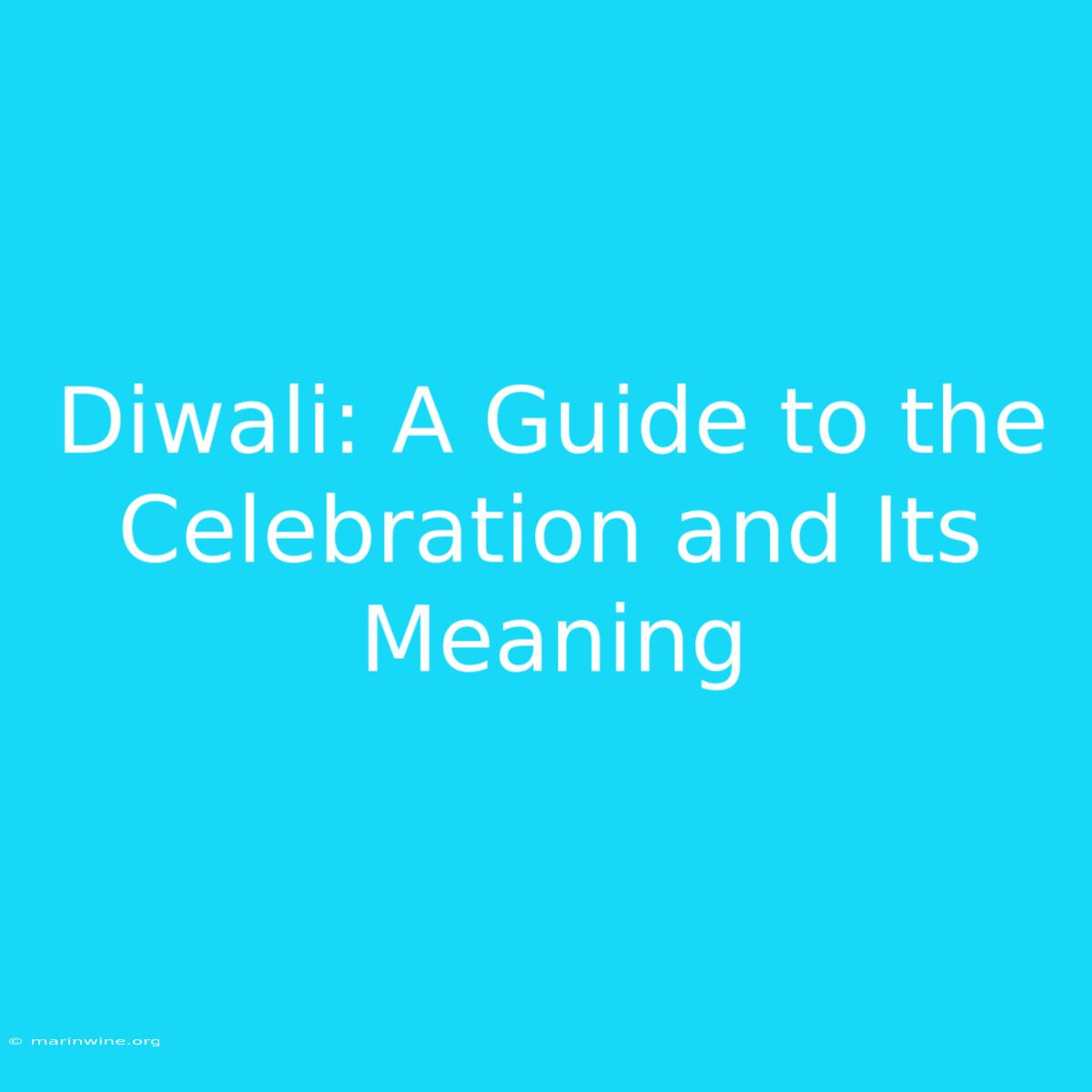Diwali: A Guide to the Celebration and Its Meaning
Have you ever wondered about the significance behind the dazzling lights and vibrant festivities of Diwali? This ancient Hindu festival, known as the "Festival of Lights," holds deep cultural and spiritual meaning. Read on to discover the fascinating story behind Diwali and learn about its celebration traditions.
Why It Matters
Diwali is a significant festival celebrated by millions of Hindus, Sikhs, and Jains worldwide. It symbolizes the triumph of good over evil, knowledge over ignorance, and hope over despair. Understanding the rich history and spiritual significance of Diwali provides a window into the cultural tapestry of India and the diaspora.
Key Takeaways of Diwali:
| Key Takeaways | Description |
|---|---|
| Festival of Lights | Diwali is celebrated with countless lights, diyas (earthen lamps), candles, and fireworks, illuminating homes and streets. |
| Celebration of Good over Evil | It commemorates the return of Lord Rama to Ayodhya after defeating the demon king Ravana. |
| Spiritual Significance | Diwali marks the victory of light over darkness, knowledge over ignorance, and hope over despair. |
| Family and Community Celebration | It's a time for families to come together, share sweets, and enjoy each other's company. |
Diwali: A Celebration of Light and Triumph
Diwali is a vibrant and colorful festival with a deep spiritual significance. It is celebrated over five days, with each day dedicated to different aspects of the festival:
Day 1: Dhanteras
Dhanteras marks the beginning of Diwali and is dedicated to Goddess Lakshmi, the deity of wealth and prosperity. People purchase new items, like utensils and jewelry, symbolizing good luck and prosperity.
Day 2: Choti Diwali
Choti Diwali, also known as Narak Chaturdashi, is a day to remember the victory of Lord Krishna over the demon Narakasura. This day is also a time for families to clean their homes and decorate them with diyas and rangoli designs.
Day 3: Diwali (Lakshmi Puja)
Diwali, the main day of the festival, is dedicated to worshipping Goddess Lakshmi and Lord Ganesha. Homes are decorated with diyas, candles, and flowers, and families perform pujas (prayers) to invoke blessings of prosperity and happiness.
Day 4: Padwa (Balipratipada)
Padwa marks the beginning of the new lunar year. It is a day for family and friends to exchange gifts and blessings, symbolizing new beginnings and fresh starts.
Day 5: Bhai Dooj
Bhai Dooj is celebrated two days after Diwali and is dedicated to the bond between brothers and sisters. Sisters apply tilak on their brothers' foreheads and pray for their well-being, receiving gifts in return.
The Significance of Light
Diwali is a celebration of light. The diyas, candles, and fireworks symbolize the triumph of good over evil, knowledge over ignorance, and hope over despair. It reminds us that even in the darkest of times, light will always prevail.
The Role of Diwali in Modern Society
Diwali remains a vital part of Indian culture, celebrated with fervor and enthusiasm throughout the world. The festival promotes social harmony, strengthens family ties, and encourages the spread of love, compassion, and goodwill. It serves as a reminder of the importance of hope, unity, and the pursuit of knowledge.
FAQ
Q1: What is the significance of diyas during Diwali?
A1: Diyas are earthen lamps that represent the victory of light over darkness. They are lit to welcome Goddess Lakshmi into homes and symbolize the eradication of negativity and the spread of prosperity.
Q2: What is the story behind Diwali?
A2: Diwali commemorates the return of Lord Rama to Ayodhya after defeating the demon king Ravana. The people of Ayodhya lit diyas to celebrate his victory, symbolizing the triumph of good over evil.
Q3: How is Diwali celebrated?
A3: Diwali is celebrated with a variety of rituals and customs, including lighting diyas, decorating homes, performing pujas, sharing sweets and gifts, and setting off fireworks.
Q4: Why is Diwali important in modern society?
A4: Diwali remains a vital part of Indian culture, promoting social harmony, strengthening family ties, and encouraging the spread of love, compassion, and goodwill.
Q5: What is the significance of fireworks during Diwali?
A5: Fireworks symbolize the celebration of joy and victory. They represent the removal of negativity and the spread of happiness.
Q6: How can I celebrate Diwali?
A6: You can celebrate Diwali by lighting diyas, decorating your home with lights and rangoli designs, sharing sweets with loved ones, and enjoying the festivities.
Tips for Celebrating Diwali
1. Decorate your home: Use diyas, candles, and colorful lights to create a festive atmosphere.
2. Share sweets and gifts: Exchange gifts and share sweets with family and friends to spread joy and happiness.
3. Attend a Diwali event: Participate in a Diwali celebration to experience the vibrant culture and festivities.
4. Learn about the history and significance: Understand the spiritual and cultural importance of Diwali to appreciate its deeper meaning.
5. Embrace the spirit of Diwali: Let the light of Diwali illuminate your life with hope, happiness, and prosperity.
Summary of Diwali
Diwali is a celebration of light, hope, and prosperity, marking the triumph of good over evil. It is a time for families to come together, share sweets, and enjoy each other's company. The vibrant festival holds a significant place in Indian culture and is celebrated worldwide, reminding us of the enduring spirit of love, unity, and goodwill.
Closing Message:
May the light of Diwali fill your life with joy, prosperity, and happiness. Let us all celebrate the victory of good over evil, knowledge over ignorance, and hope over despair, embracing the spirit of this beautiful festival.

